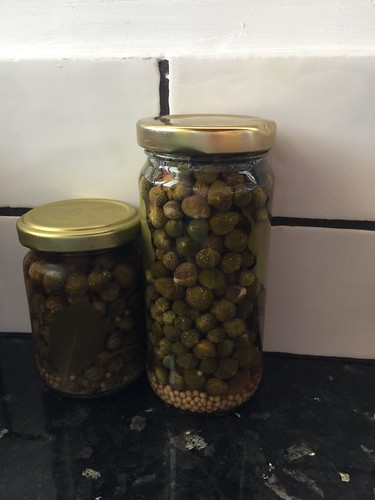Capers
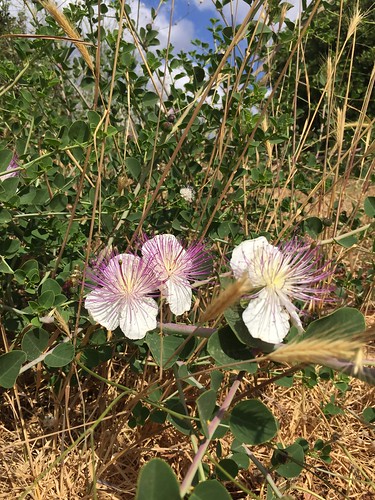
Legend has it that the caper plants originate in the Western Wall, where the little folded letters containing the prayers, dreams and promises of the pilgrims are transformed into beautiful white caper blossoms, blooming for a day and sending the prayers to heaven.
Many of the prayers are of barren couples who beg for a child of their own. Perhaps that is why these caper flowers are considered a remedy for fertility, as are the roots of the the plant. But this is only one of the many medicinal qualities attributed to capers in herbal and folk medicines. I will only highlight a few that I read about: The entire plant parts (root, leaves, fruit) were used as remedy for toothache, and an infusion of the fruit after it has been boiled in water is considered to aid those suffering from diabetes. The fruit and the root, when ground up, are placed for short periods on aching joints to relieve joint pain (long exposure of the skin will create burns). Despite all its many therapeutic values, caper is not a very common plant in the modern pharmacopeia -perhaps because of the emphasis on it as a culinary item.
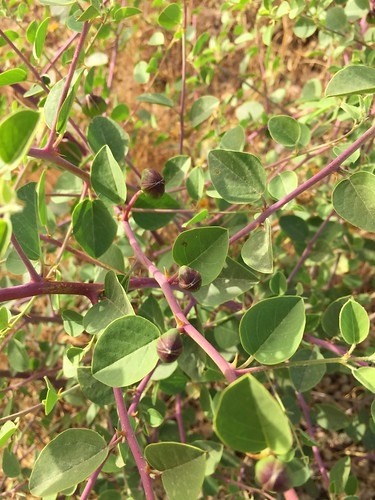
The pickled capers most people are familiar with are the buds of Capparis spinosa. It grows here in the wild, and quite in abundance. What's special about it is that it blooms all summer long, from May through September - an unusual quality in those scorching months, which on its own alludes to nearly magical qualities.
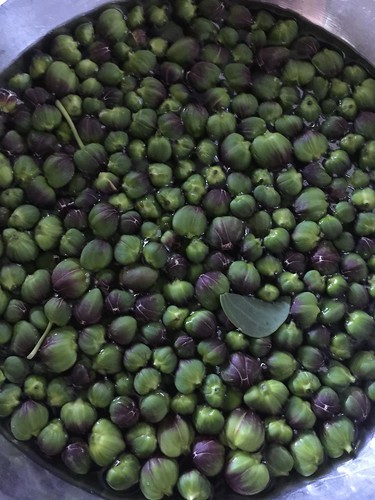
My first jar which I've pickled about three weeks ago turned to be quite the delicacy, so I thought I'd better hurry and go get some more buds before the season is over. As it turns out - in the meantime, the plants developed their fruit (AKA caper berries). They look like plump and short cucumbers are also very pickle-able, as are the leaves and stems of this plant.
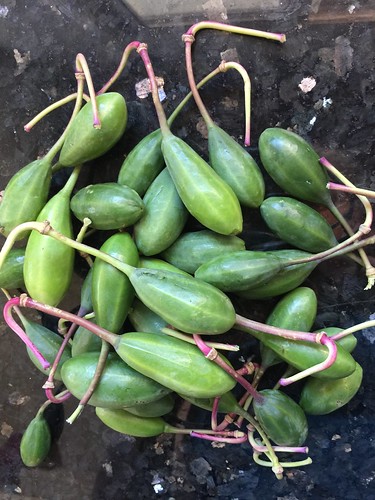
Capers has interesting history and uses - both culinary and medicinal. The famous "Cypriot wine" mentioned in the Talmud as well as in the Jewish daily prayer (used in the preparation of incense) was intact wine made of capers.
Capers have a unique flavour that is a tad mustard-like which develops while they pickle and release the glucocamparin (mustard oil) within them. Through the picking process, white or violet coloured dots will form on the buds, which contain the citrus flavalnol ruin, which is also dominant in asparagus, buckwheat flour and black raspberry. The stems can be added to yogurt, and both the stems and leaves can be pickled and added to salads.
Recipe for pickling capers:
The hardest part about this task is the actual harvest: the bushes are equipped with hook-shaped thorns that are quite vicious. Once you endured a few of these claws-in-flesh encounters, and collected enough caper buds or berries, soak them in water for three days, changing the water daily.
To pickle, sterilize a clean jar by rinsing with boiling water, fill with the capers, and cover with the salt and vinegar solution:
1/2 cup filtered or spring water
1/2 cup appel cider vinegar
1 Tbs salt
Season with:
2-4 Bay leaves
1 tsp yellow mustard seeds, whole
(Both are local spices, so to speak, that grow wild)
Marinate for one week, then keep refrigerated. The pickled buds can be used as a flavourful garnish to sandwiches to offset fatty elements such as cheese and smoked salmon. It's great as an addition to salads, marinates, stuffed vegetables, and just to eat on their own on the side with ripe watermelon or charcuterie. It can also be used to make tartar sauce, pasta sauce (spaghetti ala puttanesca, anyone?) - and just anything else your imagination may take you to.
As for the pickled caper berries (or fruit) - I have one more week to wait till they are ready. So will report later.
